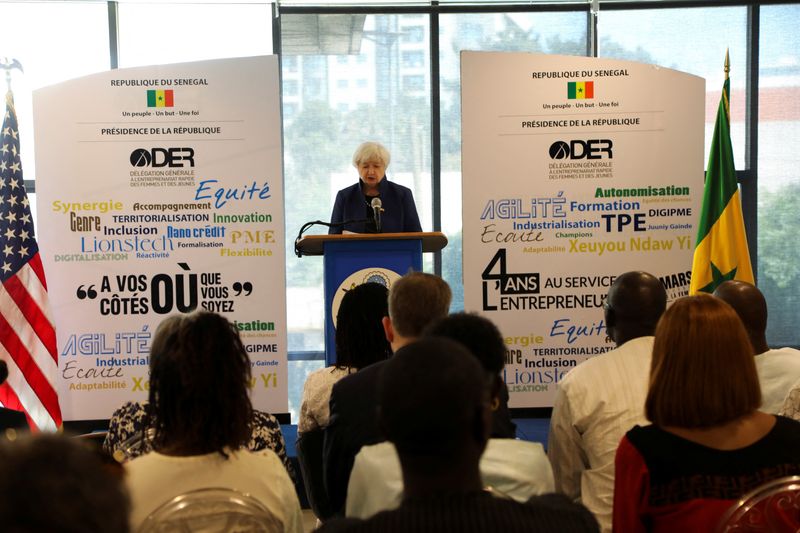By Andrea Shalal
GOREE ISLAND, Senegal (Reuters) -U.S. Treasury Secretary Janet Yellen on Saturday spoke of the "unspeakable cruelty" and enduring consequences of the trans-Atlantic slave trade, but said she was heartened by signs of progress and renewal in both the United States and Africa.
Yellen visited the House of Slaves, a fort built in the late 18th century on Goree Island off the coast of Senegal as a transit point for human beings before they were forcibly transported across the Atlantic, as she continued a three-country visit to Africa.
"I take from this place the importance of redoubling our commitment to fight for our shared principles and the values of freedom and human rights where ever they are threatened - in Africa, in the United States and around the world," she wrote in the visitor's log.
The site, now a museum and UNESCO World Heritage site, often draws high-level American visitors, including former President Barack Obama, the first U.S. president of African ancestry, who visited with his family in 2013.
South African President Cyril Ramaphosa called the island "a place of reconciliation and hope" when he visited in December 2021, noting in the log that it was the place where the talks to end apartheid in his own country began.
Yellen, at times visibly moved, underscored the enduring ties that bind Africa and the United States.
"Ultimately, Gorée Island reminds us that the histories of Africa and America are intimately connected. We know that the tragedy did not stop with the generation of humans taken from here," she said after touring the museum with its curator Eloi Coly.
Goree's mayor Augustin Senghor presented Yellen with a certificate appointing her as a lifetime ambassador of the island's history.
Goree Island was a symbol of great importance to Americans of African descent, drawing thousands of visitors every year, said Joyce Hope Scott, a professor of African American Studies at Boston University.
"Secretary Yellen and others have made a wise choice in visiting this important site and should embrace the truthful representation of Goree Island and what it stands for in the historical experience of Africans on the continent and in the diaspora," she told Reuters.
Yellen, the former chair of the Federal Reserve, has focused her work in economics on ending historic disparities that continued to plague Black Americans long after slavery was abolished in 1865. On Saturday, she said both Africa and the United States had made tremendous strides, but more work was needed to counter the brutal consequences of the slave trade.
At Treasury, Yellen has now set up a racial equity task force that has drawn the ire of Republicans, and she and her deputy, Nigerian-born Wally Adeyemo have worked hard to boost the economic conditions of communities of color.

It was critical to tell the story of enslaved people, which "while full of suffering, is also full of perseverance and hope," Yellen said, citing the important contributions of African Americans to the U.S. economy and democracy.
"With remembrance, I believe, can come progress and renewal," she said, highlighting what she called "signs of vibrant life around Gorée — a prominent art scene, a place of education, and thousands who call this place home."
